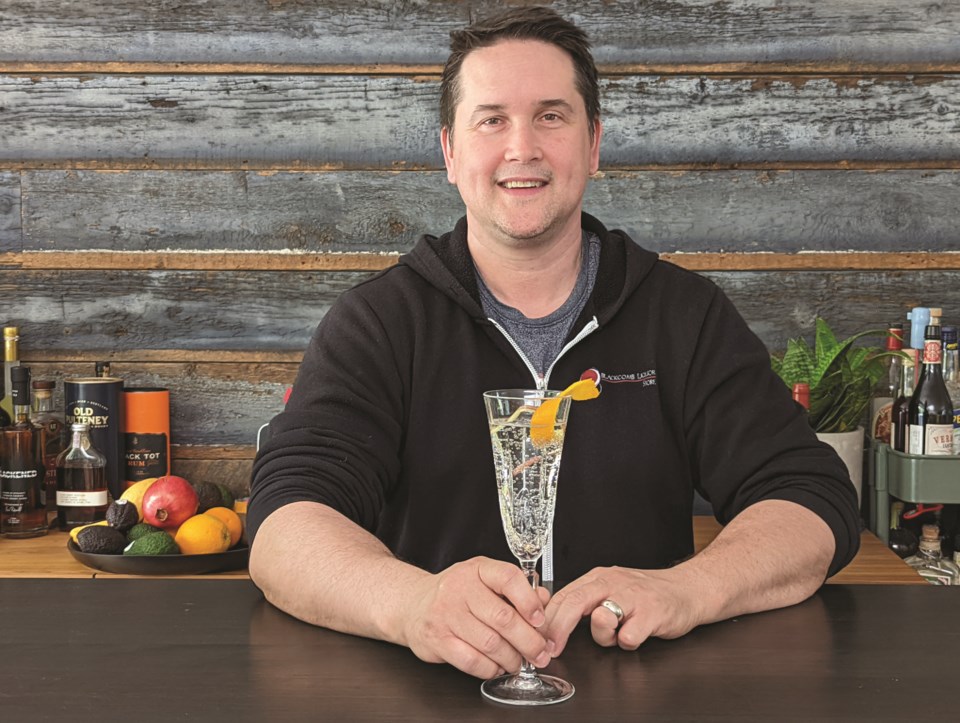On Internet Archive (a super resource if you haven’t yet discovered it), you’ll find a 1926 special edition of the Vancouver Morning Star. Printed by rotogravure (a posh way of printing anything needing high-quality photos), it features industry, development and all sorts of signifiers of “progress” in an early B.C.
The special edition devotes two full pages to the British Columbia Distillery Co. Ltd., at the time the largest distillery in Canada, known for its “popular Caledonia antique liqueur,” along with the then-multi-million-dollar brewing industry—all at least partially fuelled by the U.S. prohibition of the 1920s. It was double the space given over to B.C.’s pulp and paper industry.
Photos include 13 huge tanks, each with a capacity of 7,000+ gallons, at Vancouver Brewing Co.—”a typical one of the several plants engaged in making a clean, healthful, satisfying beverage.” Note the lack of reference to any mention of alcohol. The feature also includes a quirky disclaimer: Neither the B.C. government nor the Board of Liquor Control, as it was called then, had anything to do with the publication of said risqué images. (That’s my tongue in my cheek there, in case you couldn’t tell.)
Booze has always been big in B.C. despite any disclaimers. Think of the legendary rum runners who hid their boats in the Fraser River Delta after selling booze illegally to prohibition-bound Americans. Or the traditional B.C. resource workers, mostly single men from fishing boats, logging ops and mines, who made their way to the pubs and flophouses in what’s now Gastown to whoop it up and make up for worksites rendered booze-free for safety. Then there’s all the romance embedded in post-war, alcohol-fuelled culture. Bogie’s bar in Casablanca. Bond’s shaken, not stirred’s. And the many party-hardy aspects of resorts like Whistler, where a stylish drink or three has traditionally never been amiss.
The Vancouver Sun reports that in 2020, each British Columbian downed the equivalent of 550 beers, a 20-year high. And don’t put all the blame on the pandemic. We’ve long been among the heaviest drinkers in Canada.
But change is afoot, dear readers.
Maybe it’s the latest scientific research linking booze to more and more health issues like dementia and heart disease. Like last week’s European Society of Cardiology study that showed what many countries consider a safe level of alcohol consumption to be linked to heart failure. (Alcohol is a long-known carcinogen with no risk-free consumption levels; we’ve just chosen to ignore that fact.)
Maybe it’s an aging population finding it harder and harder to deal with the day after. Or, as Whistler’s Cathy Goddard of Lighthouse Visionary Strategies so nicely outlined in her 2019 Pique feature, maybe people are just getting “curiouser and curiouser” about revisiting their relationship with alcohol.
Whatever the reasons, more and more people in B.C. and beyond are tapping into nolo (also spelled NOLO and NoLo)—any usually alcoholized drinks that contain no or low alcohol.
Personally, I started looking for decent nolo’s decades ago after I got malaria in Borneo and, yes, I was taking antimalarials. Malaria is tough on your brain, and liver, so after years of enjoying many a Tapley’s brew, I suddenly felt queasy after a mere sip of anything boozy.
One downside was the lack of good alternatives, since creating good nolo’s is challenging, given how much taste and body depends on the alcohol. (The latest technology uses membrane separation to filter out ethanol and other undesirables.) Another downside was totally unexpected—in some contexts, I was treated like a weirdo for not wanting booze. Fortunately, things have evolved.
According to New Scientist, the nolo beer market alone is worth US$9.5 billion globally with predictions it will grow 7.5 per cent a year until 2026.
“It [nolo] is a very small part of our sales but I would say in the last few years it’s a building trend, and so in time it will get bigger and bigger,” says Michael Kompass, a sommelier, the Vintage Advice host on Whistler FM, and owner of Blackcomb Liquor Store in Upper Village, one of the more interesting of Whistler’s seven liquor stores.
Michael started stocking nolo’s a few years back with a single option—O’Doul’s no-alcohol beer. “And now we’ve got about nine different products,” he says.
Beyond nolo craft beers you might recognize, like Heineken, Red Racer and Phillips, Blackcomb Liquor Store can introduce you to some very good, very sophisticated zero-alcohol distilled botanical craft spirits. There’s Lumette! from Sheringham Distillery in Sooke, and the U.K.’s Seedlip, named for the traditional basket for tipping seeds into tilled soil. This botanical distiller creates lovely, unique flavours using ingredients like allspice, cardamom, citrus, mint—even peas and hay.
“It’s almost like making a tea out of lemon peel or juniper... You take similar essences into your liquid, then you boil that and distil it, so some of the characteristics are able to pull through into your drink, but without any alcohol involved,” says Michael. “It’s interesting to see what’s come along, and it does seem to be a trend that’s growing, sometimes from a health perspective, sometimes from a lifestyle perspective, or sometimes just circumstantial—somebody has to be the driver and maybe it’s you tonight.”
The store also carries good, flavoured sparkling water and mocktails from Vancouver’s Sparkmouth and another intriguing item—Cocktail Bomb Shop pastilles, another Canadian venture, which makes mocktail “bombs” in flavours like orange mojito that you can pop into sparkling water. Michael’s 14-year-old daughter, Scarlett, and 10-year-old son, Luke, have tried these.
Which brings us to a whole other concept with nolo’s: What this next generation coming up is enjoying as a fun non-alcoholic, reduced-sugar option on special or celebratory occasions.
For now, Luke isn’t that interested—yet, but they’ve earned Scarlett’s seal of approval.
Cheers!
Glenda Bartosh is an award-winning journalist who swears that Loxton in Australia makes the best nolo wine and Grolsch, founded in 1615 in The Netherlands, makes a great-tasting nolo beer.




